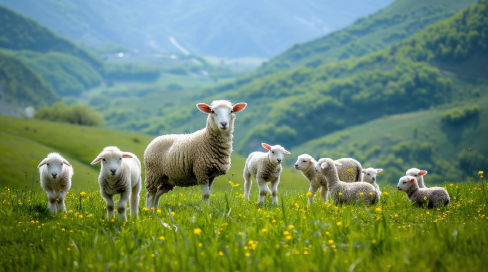In an era marked by growing environmental awareness and concerns about animal welfare, sustainable farming practices have become increasingly important in the agricultural industry. Sustainable lamb farming, in particular, holds immense potential to produce high-quality meat, promote ecological balance, and ensure the well-being of livestock. This blog post from Superior Farms delves into sustainable lamb farming, exploring the principles, practices, and benefits of nurturing the land and fostering healthy flocks.
The Importance of Sustainability in Lamb Farming
Sustainability lies at the heart of responsible lamb farming, encompassing practices prioritizing environmental stewardship, animal welfare, and economic viability. Producers can minimize their ecological footprint, conserve natural resources, and promote ecosystems’ long-term health and resilience by adopting sustainable farming methods. Sustainable lamb farming also involves ethical considerations, such as ensuring the humane treatment of animals and fostering a symbiotic relationship between farmers, livestock, and the land.
Regenerative Agriculture
At the core of sustainable lamb farming is regenerative agriculture, which seeks to restore and enhance the health of ecosystems through holistic management practices. These practices include rotational grazing, cover cropping, soil conservation, and biodiversity enhancement, all of which work together to improve soil health, sequester carbon, and enhance ecosystem resilience. By mimicking natural processes and cycles, regenerative agriculture fosters a harmonious relationship between agriculture and the environment, resulting in healthier landscapes and more sustainable food production.
Holistic Livestock Management
Prioritizing Animal Welfare and Health: In sustainable lamb farming, animal welfare is paramount, with farmers implementing practices that prioritize the health, comfort, and well-being of their flock. This includes providing access to pasture for grazing, ensuring clean water and shelter, and minimizing stress and confinement. Holistic management techniques, such as rotational grazing and predator control, benefit the animals and contribute to the land’s health and vitality. By treating livestock with care and respect, farmers can create healthier, more resilient flocks that thrive in their natural environment.
Local and Regenerative Food Systems
Sustainable lamb farming is closely linked to the broader movement towards local and regenerative food systems, emphasizing the importance of community-based agriculture, direct marketing, and transparent supply chains. By connecting farmers directly with consumers, these systems promote a deeper understanding of where food comes from and how it is produced. Consumers can support sustainable lamb farming by purchasing meat that is raised by local producers, participating in community-supported agriculture (CSA) programs, and advocating for policies that support regenerative agriculture and small-scale farming.
The Future of Sustainable Lamb Farming
The demand for ethically produced and environmentally friendly food has been on the rise for a while now, and the future of sustainable lamb farming looks promising. Farmers who embrace regenerative agriculture principles, prioritize animal welfare, and foster connections with consumers can be crucial in building a more resilient and sustainable food system.
Farmers can focus on rebuilding soil health, increasing biodiversity, and reducing greenhouse gas emissions by adopting regenerative agriculture methods. This approach enables the land to regenerate and become more productive over time, leading to better yields, healthier animals, and a thriving ecosystem.
Prioritizing animal welfare is another key aspect of sustainable lamb farming. Farmers can ensure that their animals have access to fresh air, clean water, and nutritious food, providing adequate living space and reducing stress. This ensures that the animals are treated humanely and results in healthier and more productive animals.
Fostering connections with consumers is also critical. Farmers and suppliers can build trust, share their knowledge and expertise by engaging with their customers, and provide high-quality, sustainably produced food. This helps consumers understand the value of sustainable farming practices and encourages them to make more informed choices about their food.
Through education, collaboration, and innovation, sustainable lamb farming can transform how we produce food and our relationship with the land and the animals that sustain us. Farmers like those partner with Superior Farms who and embrace sustainable practices can help build a more resilient and sustainable food system that benefits everyone.

